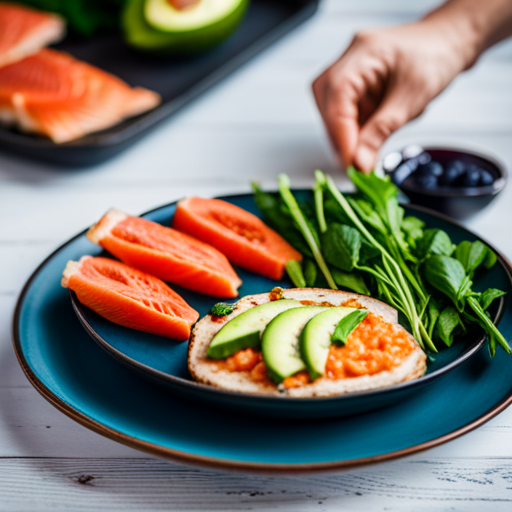The Power of Protein in Weight Loss Diets
Are you tired of going on diets that leave you feeling hungry and unsatisfied? Look no further than the power of protein in weight loss diets.
Protein is like a superhero for your body, providing you with the energy and strength you need to achieve your weight loss goals. Not only does protein keep you feeling full and satisfied, but it also boosts your metabolism, preserves muscle mass, and helps control your appetite.
By incorporating protein-rich foods into your diet, you can take control of your weight management journey and feel confident in your ability to achieve lasting results.
So, step into the world of protein and discover the secret to a safe and effective weight loss strategy.
Key Takeaways
- Protein keeps you feeling full and satisfied for longer periods of time compared to carbohydrates and fats.
- A high-protein diet can increase your metabolic rate, helping you burn more calories throughout the day.
- Protein helps preserve lean muscle mass during weight loss, which is important for maintaining a healthy metabolism.
- Protein-rich foods are more filling compared to foods high in carbohydrates or fats, helping control appetite and reduce calorie intake.
Protein and Satiety
Are you wondering how protein can help you feel fuller for longer and support your weight loss goals? Well, let’s dive into the science behind it.
Protein has been found to have a significant impact on hunger suppression and weight loss effectiveness. When it comes to feeling satisfied after a meal, protein takes the lead. It has a high satiety value, meaning it keeps you feeling full and satisfied for a longer period of time compared to other macronutrients like carbohydrates and fats.
This is due to the fact that protein takes longer to digest, which helps to slow down the emptying of your stomach and prolong the feeling of fullness. In addition to its hunger-suppressing effects, protein also plays a crucial role in supporting weight loss. Research suggests that a high-protein diet can increase your metabolic rate, meaning you burn more calories throughout the day.
Moreover, protein helps to preserve lean muscle mass during weight loss, which is important for maintaining a healthy metabolism. To harness the weight loss benefits of protein, it’s recommended to include a source of protein in each meal and snack. Good sources of protein include lean meats, poultry, fish, eggs, dairy products, legumes, and nuts.
Just remember to choose lean options and balance your protein intake with other essential nutrients for a well-rounded diet. In conclusion, incorporating protein into your weight loss journey can be highly beneficial. It helps to keep you feeling fuller for longer, supports your weight loss goals by boosting your metabolism, and helps preserve muscle mass.
Protein and Metabolism
To boost your metabolism and support your weight loss goals, protein plays a crucial role:
- Protein has a higher thermic effect compared to carbohydrates and fats. This means that your body burns more calories digesting and metabolizing protein than it does with other macronutrients. This increased energy expenditure can help you achieve a calorie deficit, which is essential for weight loss.
Here are three key ways protein impacts your metabolism:
-
Protein requires more energy for digestion. When you consume protein, your body needs to work harder to break it down into its individual amino acids. This process, known as protein thermogenesis, can increase your energy expenditure by up to 30% compared to fats and carbohydrates.
-
Protein helps preserve lean muscle mass. During weight loss, it’s important to preserve your muscle mass to maintain a healthy metabolism. Protein provides the building blocks for muscle tissue and helps prevent muscle breakdown, ensuring that your metabolism stays active and efficient.
-
Protein increases satiety. Protein-rich foods are known to be more filling compared to foods high in carbohydrates or fats. By increasing feelings of fullness and satisfaction, protein can help control your appetite and reduce overall calorie intake.
Incorporating protein-rich foods such as lean meats, poultry, fish, eggs, dairy products, legumes, and tofu into your diet can have a positive impact on your metabolism and support your weight loss efforts. Remember to consult with a healthcare professional or registered dietitian before making any significant changes to your diet.
Protein and Muscle Preservation
Preserve your muscle mass during weight loss by incorporating protein into your diet. Protein plays a crucial role in muscle building and athletic performance. When you’re on a weight loss journey, it’s important to focus on preserving your muscle mass to maintain strength and support overall health.
Protein is made up of amino acids, which are the building blocks of muscles. When you consume protein, your body breaks it down into amino acids and uses them to repair and build new muscle tissue. By including an adequate amount of protein in your diet, you provide your body with the necessary nutrients to support muscle growth and maintenance.
In addition to muscle building, protein is also essential for athletic performance. It helps improve muscle strength, endurance, and recovery. When you exercise, your muscles undergo stress and micro-tears. Protein aids in repairing these tears and promoting muscle growth, enabling you to perform better in your workouts.
To effectively preserve your muscle mass during weight loss, aim to consume a sufficient amount of protein each day. The recommended daily intake varies depending on factors such as your weight, activity level, and goals. A general guideline is to consume 0.8-1 gram of protein per kilogram of body weight. However, if you’re engaging in intense physical activity or strength training, you may need to consume a higher amount of protein.
Incorporating protein-rich foods into your diet is a great way to meet your protein needs. Sources of protein include lean meats, poultry, fish, eggs, dairy products, legumes, and tofu. You can also consider supplementing with protein powders or bars if needed.
Protein and Appetite Control
As you continue incorporating protein into your weight loss diet, you may notice that it helps control your appetite more effectively. Protein has been found to have a satiating effect, meaning it can help you feel fuller for longer periods of time. This can be particularly beneficial when trying to lose weight, as it can help reduce food cravings and prevent overeating.
Here are three ways in which protein can help control your appetite:
-
Protein and food cravings: Protein has been shown to reduce cravings for unhealthy, high-calorie foods. By including protein-rich foods in your diet, such as lean meats, fish, eggs, and legumes, you may find yourself less tempted by sugary snacks and processed foods.
-
Protein and meal replacements: Incorporating protein shakes or bars into your weight loss plan can be an effective way to control your appetite. These meal replacements are often high in protein and can help you feel satisfied while consuming fewer calories.
-
Protein and calorie balance: Protein requires more energy to digest compared to carbohydrates and fats. This means that your body burns more calories when processing protein-rich foods. By including adequate protein in your meals, you can help maintain a healthier calorie balance and support your weight loss efforts.
Protein and Weight Management
If you want to effectively manage your weight, incorporating protein into your diet is essential. Protein not only helps to control your appetite, but it also plays a crucial role in weight management through its impact on energy expenditure and body composition.
When it comes to energy expenditure, protein has a higher thermic effect compared to carbohydrates and fats. This means that your body burns more calories during the digestion and absorption of protein. In fact, studies have shown that increasing protein intake can boost your metabolic rate and increase the number of calories you burn throughout the day.
In addition to its effect on energy expenditure, protein also plays a key role in maintaining and improving body composition. It helps to preserve lean muscle mass while promoting fat loss. This is important because muscle tissue is metabolically active and burns more calories at rest compared to fat tissue. By including protein in your weight management plan, you can help to preserve and build lean muscle mass, which can lead to an increase in your overall metabolic rate.
To further illustrate the importance of protein in weight management, consider the following table:
| Protein Intake | Energy Expenditure | Body Composition |
|---|---|---|
| High | Increased | Improved |
| Moderate | Maintained | Maintained |
| Low | Decreased | Declined |
As you can see, higher protein intake is associated with increased energy expenditure and improved body composition, while lower protein intake is linked to decreased energy expenditure and declined body composition.
Frequently Asked Questions
What Are the Best Sources of Protein for Weight Loss Diets?
The best sources of protein for weight loss diets include high protein snacks and protein powders. These options can help you meet your protein needs while keeping calories in check, supporting weight loss goals.
Can Consuming Too Much Protein Harm My Kidneys?
Consuming too much protein may raise concerns about kidney health, but research suggests that for most healthy individuals, a high protein intake is unlikely to cause harm. Protein is essential for muscle building and can aid in satiety during weight loss diets.
How Does Protein Intake Affect Blood Sugar Levels in Weight Loss Diets?
Protein intake in weight loss diets can affect blood sugar levels and insulin response. It is important to understand the relationship between protein intake and blood sugar levels to ensure safe and effective weight loss.
Is It Necessary to Supplement Protein in a Weight Loss Diet?
You don’t have to supplement protein in a weight loss diet, but it can help if you struggle to meet your protein needs through food alone. Protein shakes and bars are popular alternatives. Increasing protein intake can also support muscle gain during weight loss.
What Is the Recommended Daily Intake of Protein for Individuals Following a Weight Loss Diet?
To effectively lose weight, it is recommended that individuals following a weight loss diet consume an adequate daily intake of protein. Protein has been shown to support weight loss by increasing feelings of fullness and boosting metabolism.
Conclusion
In conclusion, protein plays a pivotal role in weight loss diets. It acts as the foundation, providing the necessary tools for satiety, boosting metabolism, preserving muscle mass, and controlling appetite.
Think of protein as the key that unlocks the door to successful weight management. By incorporating protein-rich foods into your diet, you can harness its power and achieve your weight loss goals effectively and efficiently.









